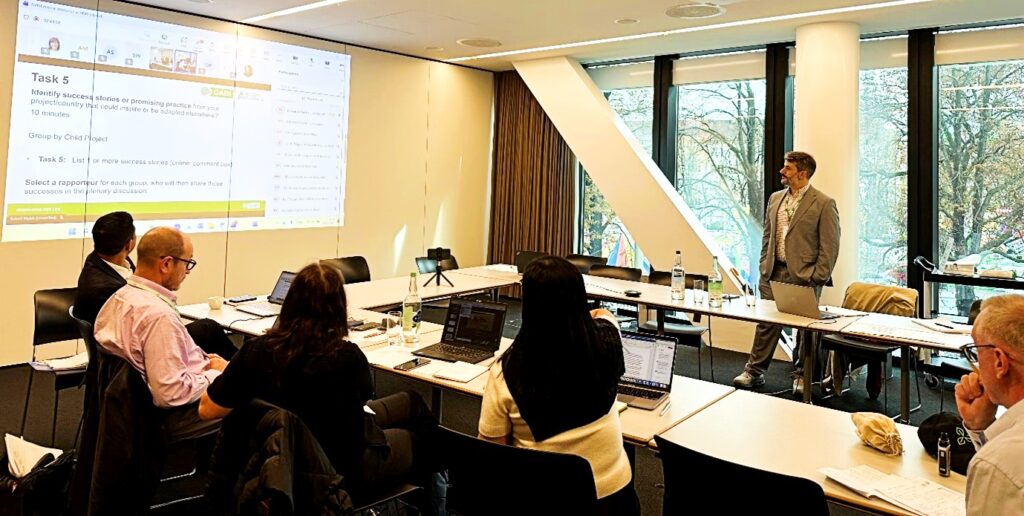
Financing Agrochemical Reduction and Management (FARM) is a five-year, $37 million initiative funded by the Global Environment Facility (GEF), with an additional $341 million in co-financing.
Led by the United Nations Environment Programme (UNEP) and implemented by the Asian Development Bank (ADB), United Nations Development Programme (UNDP) and United Nations Industrial Development Organization (UNIDO), FARM aims to transform agrifood value chains through reducing the use of harmful pesticides and agricultural plastics, and safeguard ecosystems and human health for future generations.
To achieve this, FARM provides technical assistance and tools that help redirect public and private finance, policies and practices towards low-input, pollution-free solutions for agriculture. It promotes knowledge exchange and connects global and regional expert networks to accelerate the shift to safer alternatives across agricultural and food value chains.
FARM is implemented through projects in seven countries
FARM is implemented through projects in seven countries – Ecuador, India, Kenya, the Lao People’s Democratic Republic, the Philippines, Uruguay, and Vietnam – and is coordinated through a global project hosted by the Green Growth Knowledge Partnership (GGKP).
CABI and the Pesticide Action Network of the UK (PAN-UK) have been commissioned by GGKP to conduct a comprehensive scoping study to:
•Map global training and resource materials on Highly Hazardous Pesticides (HHPs) and their alternatives
•Identify key knowledge gaps and capacity needs
•Develop a stakeholder engagement strategy to inform policy coherence and sustainable practice.
Colleagues from CABI and PAN-UK co-facilitated a dynamic and participatory workshop during the Annual Biocontrol Industry Meeting (ABIM) in Basel. The workshop provided an important opportunity to validate early findings from the ongoing questionnaire and desk review, enrich them with practitioner insights, and prioritize emerging needs.
The session brought together project managers and representatives from FARM’s implementing and executing agencies, as well as the FARM Global Child Project, to explore emerging insights and shared priorities under FARM’s Component 1: Policy and Enforcement.
A collective effort for sustainable change

Component 1 of the FARM Global Child Project focuses on strengthening policy and enforcement frameworks related to pesticide management and agri-plastics, on creating an enabling environment for promoting the production, licensing and use of bio-control systems such as biopesticides; and supporting the phase out and environmentally sustainable end of life management of HHPs such as persistent organic pollutants (POPs) and agri-plastics. It also seeks to strengthen enforcement of regulations and restrictions on pesticides and agri-plastics.
The intended purpose of agricultural inputs such as pesticides and agri-plastics is to contribute to productivity and/or crop quality, but they can also have significant negative impacts e.g. on ecosystem services such as soil health and pollination as well as on human health and the environment.
As a group, HHPs are the most problematic pesticides as they are “acknowledged to present particularly high levels of acute or chronic hazards to health or the environment according to internationally accepted classification systems” or “appear to cause severe or irreversible harm to health or the environment under the conditions of use in a country”.
The international community has recognized HHPs as a particularly significant issue and has called for concerted action to address them. Meanwhile, in many countries, existing regulatory frameworks impede access to lower risk plant protection products.
For example, the registration process for biopesticides is often identical to that of conventional chemical pesticides, imposing an unnecessarily high and inappropriate regulatory burden. Another barrier to pesticide risk reduction is inadequate implementation of regulations, leading to weak control and enforcement systems.
An engaging, participatory format
Facilitated by Dr Robert Malek, Dr Anna Wood, and Dr Melanie Bateman from CABI, with Dr Sheila Willis and Alex Stuart from PAN-UK, the 90-minute hybrid session combined interactive polling via Mentimeter with group discussions and stakeholder mapping exercises.
Participants worked together to:
•Review and refine preliminary findings from the scoping study
•Identify missing or over-emphasized knowledge gaps
•Map key national and regional stakeholders engaged in pesticide management
•Share success stories and promising practices that could be scaled or adapted across countries.
The hybrid format created an inclusive and collaborative atmosphere—linking in-person participants in Basel with online colleagues worldwide.
Emerging Insights and Shared Priorities
Mentimeter polls revealed rich and diverse perspectives across projects. Participants highlighted the need for:
•Greater technical support and tools to phase out HHPs
•Enhanced monitoring and enforcement capacity for persistent organic pollutants and pesticide regulations
•Expanded access to and understanding of biopesticides and other low-risk alternatives
•Improved systems for data collection, including gender-disaggregated information at farm level.
In group work, participants identified key stakeholders across government, research, private sector, and civil society who could play pivotal roles in strengthening policy implementation.
Sharing Successes Across the FARM Network
Rather than focusing on traditional “success stories,” participants shared how their projects have faced and overcome real implementation challenges.
From India, colleagues shared how the project’s initial activities could only move forward once a clear and inclusive stakeholder engagement strategy was in place. By taking time to identify and involve the right actors, from government departments to research institutions and civil society, the team was able to build trust, align priorities, and create the enabling conditions for progress.
In Kenya, the establishment of two technical working groups, one dedicated to agri-plastics and another to pesticides, proved instrumental in setting the pace and direction of project activities. These groups provided structured platforms for collaboration, allowing stakeholders to identify national needs, define shared goals, and ensure that external interventions were aligned with domestic priorities.
These stories underscored the importance of peer learning and cross-country exchange within the FARM network.
Looking Ahead
The workshop outcomes, including the validated list of knowledge gaps, stakeholder priorities, and success stories, will directly feed into the ongoing scoping study and the design of knowledge products, training resources, and a global policy workshop planned for 2026.
Participants expressed strong support for learning through FARM’s planned Community of Practice, recognizing its potential as a valuable space for sharing lessons, fostering collaboration, and amplifying impact across projects.

